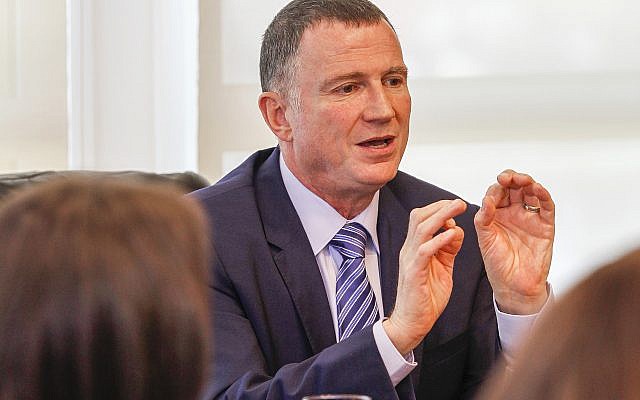Elections Raise Issues of Term Limits, Peace Agreement
Prime Minister Benjamin Netanyahu's win in Israel’s recent election has many wondering what the future of the 70-year nation-state holds.
Patrice Worthy is a contributor at the Atlanta Jewish Times.

Prime Minister Benjamin Netanyahu’s win in Israel’s recent election has many wondering what the future of the 70-year nation-state holds. Some predict Netanyahu’s Likud Party will become even more religiously stringent given the ultra-Orthodox control over the Law of Return affecting American Jewry, and the group’s exemption from military service.
One of the issues that has come up since the election, especially among young Israeli voters, is the question of term limits, said Yuli Edelstein, the speaker of the Knesset and second in command under Netanyahu.
“In town hall meetings and discussions, potential voters always raise the question of term limits, partially because the prime minister is finishing 10 years in the office and many ask, ‘Forever, or what’s going on?’” Edelstein said.
“The idea isn’t a bad idea, but in the Israeli system it is a very bold interfering of internal party affairs. For one, I think before we start legislating for this, why don’t we legislate for internal primary elections in each party?”
Another outcome of the election that is gaining attention is the makeup of Arabs in the Knesset.
The 21st Knesset begins April 30, a government with Arabic parties holding much less power. Since the election the newspaper Haaretz reported “an exceptionally low turnout among the Arab voters,” 13 percent less than in 2015, which resulted in a loss of representation in the Knesset. However, leading up to the elections, the Arab parties lost seats because of a splitting into two factions, Edelstein said.
In 2015 the four major Arab parties – Arab Movement for Renewal (Ta’al), Balad, the United Arab List (Ra’am) and the mixed Arab and Jewish Hadash Party – formed the Joint List. It was a smart political move resulting from the Knesset raising the threshold of votes needed to gain a seat from 2 to 3.25, legislation Edelstein said he was against. “I was opposed to that and, as the speaker of the Knesset, I didn’t vote with the coalition. I can’t vote for legislation that was trying to erase certain factions in the Knesset. The result was all the Arab factions united. I think ideologically it was a big problem, but the practical result was they had a strong faction.”
This year things were different, he said. The parties broke into factions, Ra’am Balad and Hadash Ta’al, mainly due to a difference in ideology, which resulted in them losing seats even before the election took place, Edelstein explained.

“The faction that stayed here was 13 seats, which was the third-largest faction in the Knesset,” he said. “Right now, they spilt again into two, so now they have less representation.”
Representation matters, especially when a peace agreement is imminent, Neil Lazarus, political analyst and Middle East/Israel expert, said. He cited former U.N. Ambassador Nikki Haley, stating, “both the Palestinians and Israel will pay a price.” He predicted Israel will give up Gaza, a territory he said is rife with internal conflict. As it stands Hamas troops are arresting Palestinians protesting the regime. And according to him, there are four reasons for the recent explosions of violence in Gaza: internal politics, the Israeli election, they have nothing to lose, and fear of the Trump campaign and what’s coming.
“The Palestinian Authority was set up as a part of the Oslo Accords and the Palestinian government is opposed to Hamas,” Lazarus said. “Right now, it’s shaping up to be a people with two governments, and if Trump recognizes Gaza as an independent Palestinian state, that would be an advantage to Hamas.”
One of the biggest questions on the table is if Israel is willing to give up land to the Palestinians. If Israel gave up Gaza, Israel would only be nine miles wide. And one of the biggest challenges is then dealing with the issue of refugees, Lazarus said. According the U.N. definition, a refugee is anyone who left the area, willingly or unwillingly, and their descendants. If the Palestinians get their way that means 5 million Palestinians in a two-state solution, which Lazarus said would result in a Palestinian/Palestinian situation. It’s an issue Edelstein said was not addressed during the Oslo Accords or Ariel Sharon’s unilateral withdrawal to the 1967 borders or the “Green Line.” Now, Edelstein believes it could turn into a serious problem.
“The process was referred to as Gaza and Jericho first. We first give Gaza and Jericho to the Palestinians, and what happened next? … We won’t get to the issue of Jerusalem, we won’t get to the issue of refugees and won’t get to the issues of communities in Judea and Samaria. What happens next?” Edelstein asked
“When we tell the Israelis ‘Let’s do it the nice way’ or ‘Let’s do it unilaterally,’ it doesn’t work. A couple more attempts like that and the majority of Israelis will say peace is not possible, let’s just shoot as many Palestinians as we can, and then it’s no peace and I’m not sure this a great situation to be in.”
But Lazarus said age plays a significant role in the conflict. He says any 30-year-old on either side grew up thinking peace was possible, and a 25-year-old Israeli grew up with bus bombings. The real underlying issue is that it’s about real people, which many seem to forget, Lazarus said.
“It’s about raw emotion and if you don’t get that, you don’t get what it’s about.”



comments